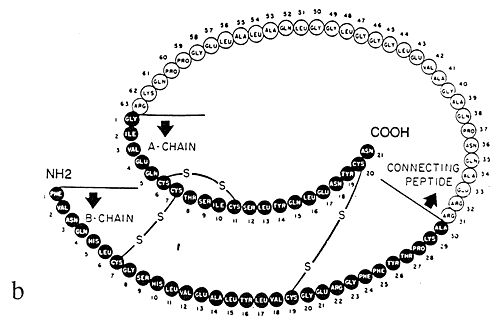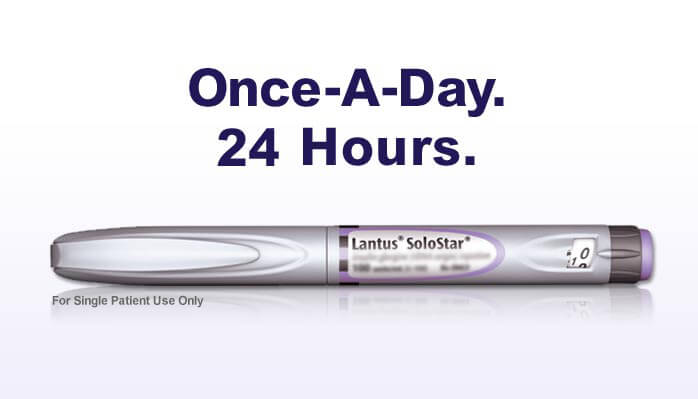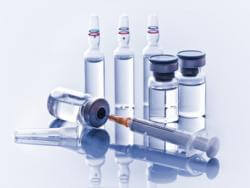This post is also available in:  Français
Français  Italiano
Italiano  Español
Español

What is Insulin?
 The hormone insulin plays a key role in regulating glucose levels in the blood. A shortage of insulin, or an inability to respond adequately to insulin, can lead to symptoms of diabetes. In addition to its role controlling blood sugar levels, insulin is also involved in storing fat.
The hormone insulin plays a key role in regulating glucose levels in the blood. A shortage of insulin, or an inability to respond adequately to insulin, can lead to symptoms of diabetes. In addition to its role controlling blood sugar levels, insulin is also involved in storing fat.
Therefore the hormone insulin plays a number of important roles in the body’s metabolism while it regulates the way the body uses and stores glucose and fats.
A large number of the body’s cells depend on insulin to get glucose from the blood to use as energy.
Different Types of Insulin: Rapid, Intermediate or Long-Acting
1- Rapid-acting insulin
The chemical structure of a fast-acting insulin has been changed so that it is absorbed more quickly into the bloodstream. This change in insulin’s chemical structure has no affect on its ability to lower blood sugar (glucose), but it affects the speed at which insulin is absorbed. Fast-acting insulin is thus absorbed into bloodstream in minutes and has many potential benefits for people with diabetes.

There are currently three fast-acting insulins. The first is generically called lispro but it is marketed under the name Humalog and manufactured by Eli Lilly. Humalog is the oldest of the three fast-acting insulins and has been available on the market since 1966.
A second fast-acting insulin was approved by the US Food and Drug Administration in 2000. This insulin has the generic name Aspart, but is sold under the brand name NovoLog and produced by Novo Nordisk.
The most recent addition to fast-acting insulins is called glulisine insulin. It became available in 2006. it is especially known by its brand name Apidra and is marketed by Sanofi-Aventis.
Fast-acting insulins are used in insulin pumps to provide a low but continuous level of insulin. This continuous flow of insulin is often called basal insulin and is necessary for managing normal blood sugar fluctuations in between meals and during sleep. Other fast-acting insulin units are given during meals to compensate for the rise in glucose from the food you’re eating.
2- Intermediate-acting insulin
Intermediate-acting insulins start working after 2-4 hours, peak around 6-7 hours after intake and last about 20 hours. Intermediate-acting insulin is isophane insulin – also known as neutral protamine Hagedorn (NPH).
Intermediate-acting insulin is often used for treatments twice a day. It can be mixed with soluble insulin, but ready-for-use options are also available.
3- Long-acting insulin
There are two long-acting insulin products. The first, insulin glargine (Lantus), lasts up to 24 hours, while the second, insulin detemir (Levemir), lasts 18-23 hours.

Long-acting insulin is usually injected once a day to maintain a stable blood sugar level. You use a disposable needle or epipen to give the injection. This long-acting insulin should be injected at the same time every day to avoid any gaps in insulin coverage or a “buildup” of insulin doses.
It’s sometimes advisable to take long-acting insulin before a meal to avoid a spike in blood sugar after eating.
Like all drugs, insulin injections can cause side effects. For example hypoglycemia may occur, which is an abnormally low concentration of sugar in the blood. Symptoms of hypoglycemia include dizziness, chills, blurry vision, weakness, headaches and fainting. Other possible side effects are from the injection itself. For example, you may experience pain, redness or swelling in the skin at the point of injection.
Insulin in Bodybuilding and Weightlifting
 Insulin is one of the body’s most anabolic hormones for muscle strengthening. Specifically, it’s a hormone released by the pancreas in response to the available nutrients. A meal rich in carbs, proteins or both causes a rise in circulating insulin.
Insulin is one of the body’s most anabolic hormones for muscle strengthening. Specifically, it’s a hormone released by the pancreas in response to the available nutrients. A meal rich in carbs, proteins or both causes a rise in circulating insulin.
Insulin acts on target cells to increase the absorption and storage of key nutrients for building muscle. Insulin increases the nutrient carriers that transport glucose and amino acids to the muscle cells, while preventing the catabolism of these nutrients stored as carbohydrates, proteins or fats.
As such, an increase in insulin levels creates an optimal anabolic environment conducive to muscle growth. Consuming proteins and carbs just before a workout prevents stored muscle proteins from being used for energy. But the post-workout period is even more important when it comes to maximizing muscle growth.
In the world of bodybuilding, insulin is readily available if you look for it. It is taken once a day and often used before competitions. Insulin will “feed” muscles with sugar. Increased sugar will give you more time to work out before exhaustion. However it also risks damaging your natural ability to produce insulin because your pancreas will stop producing it if your body signals that it has enough.
Like any anabolic or steroid, using insulin for bodybuilding can lead to health problems. High blood pressure, heavy breathing and even diabetes can arise, especially if you poorly manage your injection doses.
How to Use Insulin with Growth Hormone
 Insulin is essentially a hormone produced by the pancreas and regulates the body’s glucose levels. It carries glycogen and other nutrients to the muscles. It binds to another protein on the outside of insulin receptor cells, which changes the cell’s metabolism. Insulin increases protein synthesis and makes cells draw amino acids from the blood to transform them into proteins.
Insulin is essentially a hormone produced by the pancreas and regulates the body’s glucose levels. It carries glycogen and other nutrients to the muscles. It binds to another protein on the outside of insulin receptor cells, which changes the cell’s metabolism. Insulin increases protein synthesis and makes cells draw amino acids from the blood to transform them into proteins.
Growth hormone is produced by the pituitary gland. It encourages tissue growth, protein deposits and the distribution of subcutaneous fat stores. Growth hormone also stimulates growth in most body tissues by increasing the number of cells. The transport of amino acids and protein synthesis also increase. This, of course, is why bodybuilders use it.
Growth hormone and insulin work better used together than they ever could alone because they complement each other very well. Growth hormone increases glucose production in the liver and induces insulin resistance by blocking this hormone’s activity in the target cells. Fundamentally, growth hormone helps the body make better use of insulin. The body needs a greater quantity of thyroid hormones, insulin and androgens when growth hormone levels are elevated. Thus growth hormone and insulin enable bodybuilders to gain significant muscle.
This mix is undeniably effective. But like everything else, it is very important not to take excessively high doses and risk the deterioration of both your physical appearance and your health. The insulin dosage is particularly essential, because insulin works on fat cells in the same way it works on muscle cells. And extra insulin in your body will automatically result in stored sugars and fats.


